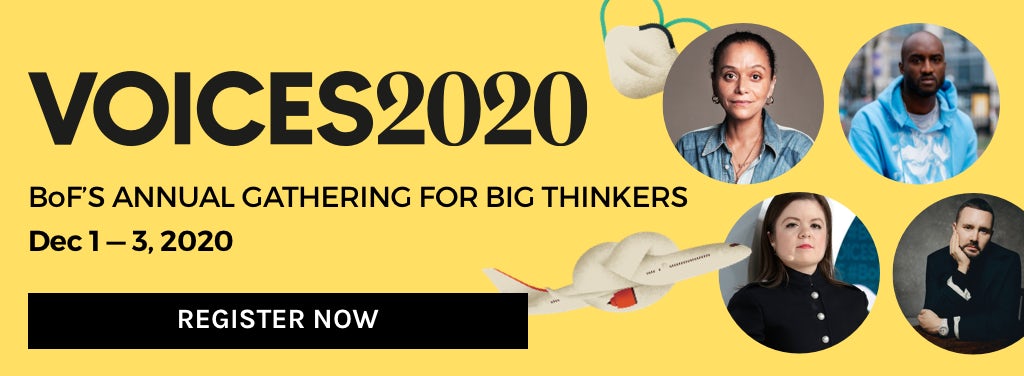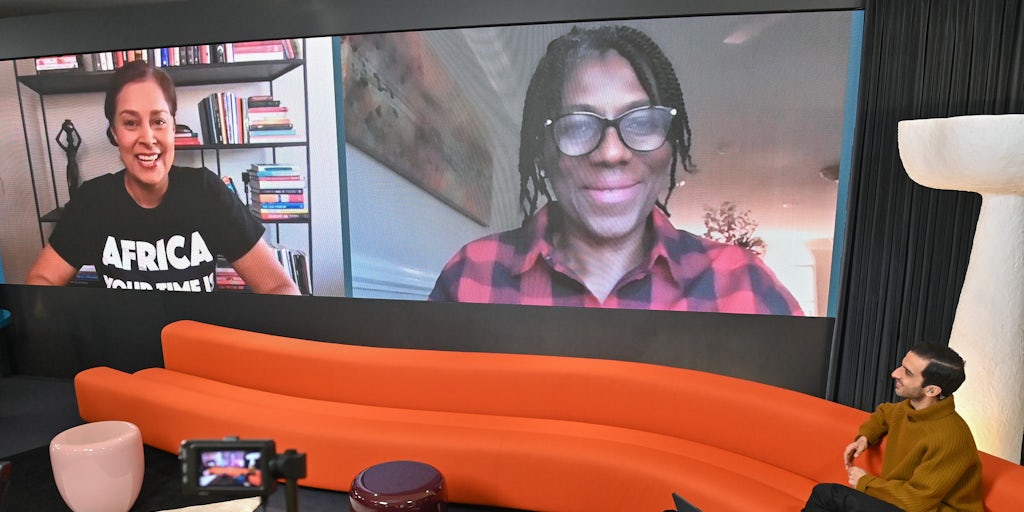VOICES 2020: How Technology Is Shaping Culture and Consumption | BoF Professional, Technology & innovation, VOICES, News & Analysis

If the pandemic has proven anything in fashion, it’s that every business must be digital-first to survive and thrive. While the crisis is far from over, industry leaders see that Covid-19 will “propel a digital transformation in fashion unlike the decades of movement online had already,” as Rent the Runway founder and chief executive Jennifer Hyman told BoF’s Lauren Sherman.
Their conversation rounded out the second session of VOICES on Wednesday, a series that examined how consumers are engaging with technology in 2020 and beyond, how these shifts may become permanent behaviours and how brands can use digital connections to their advantage.
Consumers spent many more hours engaging with technology and media in 2020, said media analyst Michael Wolf. The time spent was fueled by the popularity of new social media platforms like TikTok and Clubhouse as well as the explosive rise of gaming, a world with which fashion has yet to fully engage.
Other speakers from the world of social media and gaming, including multi-player gaming firm Incubate’s co-founder Herman Narula and Clubhouse co-founder Paul Davidson, addressed the thirst for authentic spaces for online dialogue that not only replace in-person conversations but, in many cases, are more meaningful than offline experiences.
This shift poses complicated questions for fashion, a tactile industry that seeks to be at the centre of culture, increasingly formed online, to connect with consumers and build brand values. Jake Barton, the founder of design firm Local Projects, which weaves technology into physical spaces to draw emotional connections between consumers and institutions, provided some compelling answers.
Meanwhile, digitally-driven businesses are having their own challenges and reevaluating how consumer habits will impact their future growth. From Africa, e-commerce leader Jumia’s chairperson Juliet Anammah spoke about a mindset shift that has yet to turn into significant behaviour shift. And from the US, Hyman spoke about giving consumers the freedom to own a piece of clothing for as long as they want — in a smart and sustainable way.
Read on for highlights from the second day of Voices, distilled down for BoF Professionals:
How We Spend More of Our Time Online is Changing
Wolf, the founder and chief executive of Activate Consulting, opened BoF’s afternoon session with a statistic: in 2020, the average person spent more than 13 hours per day on technology and media, up from 12 hours and 24 minutes in 2019.
“We are at a time where the worlds of technology, media, e-commerce and fashion are all colliding,” he said.
A subset of people Wolf dubbed super-users, 23 percent of the total audience, spend more than 14 hours a day on technology on media and over-index in every category of consumption, including e-commerce where they spend five times as much money as other users on purchases.
While social media was already representing much of that time spent online, TikTok saw huge growth this year, with the average user spending almost double the amount of time on that app than on Instagram, and for twice as long on average each session to an average of 21 minutes per day.
But nothing compares to the world of gaming, which Wolf described as the “new technology paradigm,” pointing to the importance of customisable “skins,” which can include clothing and other accessories used in games, and are an opportunity for fashion brands to embed themselves in the gaming world. “Everything you are going to be able to do in other worlds — in the internet and other places and the physical world — you’re going to be able to do inside of gaming,” he said.
The Rise of the Multiversal Self
Herman Narula joined VOICES to discuss the importance of memorable experiences in the virtual world. Narula is the co-founder and chief executive office of Improbable, a software company that allows multiple players to play games together, creating online communities that he said can have more influence than real-life experiences, especially with young people.
“Having an experience inside a game isn’t really any different from an experience that would happen in the real world,” he said, describing games not only as entertainment but as a way to fulfil a psychological need for self-expression and autonomy.
For the fashion industry, the gaming world is essential to understand because it will become a place “where culture is born,” Narula said, a place where new celebrities are minted, memes are produced and new terminology emerges.
Technology as a Metaphor for Connection
Technology isn’t just replacing real-life experiences, but also enhancing them, said Jake Barton, the founder and principal of multidisciplinary firm Local Projects during his session at VOICES. Through projects for institutions like The New York Times and the Cooper Hewitt Design Museum, Local Projects aims to create digitally enabled spaces that invite visitors or customers to be creative and engage with art or storytelling. Barton encouraged the audience to think about technology not as a gizmo or transactional device, but as a metaphor or tool to create meaning, interaction and engagement.
One example of a project that demonstrated the ways technology can enhance physical spaces was a program designed for Fashion for Good in Amsterdam, a museum, store and think tank to educate on and combat climate change. Every visitor received a tech-enabled bracelet made from plastic dredged from the city’s canals, which consumers could use to make pledges about behavioural changes throughout the museum.
“It’s essentially a way to catalyse between consumers, industry insiders and designers … all together gathering to make a transformation in our industry,” Barton said.
Creating a Space to Listen and Learn
Fashion is an industry that is driven by visuals. What is its role in a purely audio platform? This was one of the provocative questions raised when Paul Davidson, the co-founder and chief executive officer of the new audio social media app Clubhouse, joined Virgil Abloh, creative director and artistic director of Off-White and Louis Vuitton’s menswear, to discuss the power of audio connections. Abloh is an avid user of Clubhouse since it launched in beta, invitation-only form a year ago.
“It’s more about connecting with people and having conversations than getting likes or follows or projecting [a view of yourself] out into the world,” said Davidson. “It’s sort of like the hallways of this conference: it’s all on your phone, there’s no video, you can connect with people, you can learn or you can just be a fly on the wall.”
Abloh said he enjoys Clubhouse because it allows him to look outside the insular world of fashion and go beyond the superficial dialogue of other social media platforms.
“All the conversations that I’ve hosted or been a part of on Clubhouse related to fashion in a weird way have been more in-depth than interviews or regular format media,” he said. “It’s an interesting case study making sure brands have something to say when you can’t escape to creating an image.”
Africa’s E-Commerce Revolution Is About Resilience
The pandemic accelerated the use of e-commerce around the world as many consumers were stuck at home. What did it mean for Africa, where e-commerce penetration is still only around three percent?
“It is more of a mindset shift that has happened this year, not so much a drastic change in terms of shopping patterns,” said Juliet Anammah, the chairperson and group head of institutional relations for Jumia Group, known as the “Amazon of Africa” and the first African startup to list on the New York Stock Exchange when it went public last year. “Before, people had a narrow view of what they could buy online.”
Despite the myriad challenges around consumer education and logistics, Anammah told Zain Verjee, Kenyan journalist and communications consultant, that the future is bright for e-commerce in the continent. “That mindset shift is here to stay.”
Anammah said she hopes to partner further with African governments to catalyze growth and incentivise e-commerce consumption for shoppers.
Rethinking Rental and Resale in a Crisis
The afternoon session culminated in a conversation between BoF’s chief correspondent Lauren Sherman and the co-founder and chief executive of Rent the Runway Jennifer Hyman, whose start-up introduced and popularised renting fashion on a wide scale in the US. But when the pandemic hit the country in March, Hyman told Sherman it quickly became apparent that the company would be extremely challenged for many months to come as consumers stopped heading to offices and events.
“As a leader, that was for sure the hardest thing that I’ve ever had to do,” Hyman said about the layoffs and furloughs the company had to execute, along with other capital and operational expense cuts.
Once the company was stabilised from a financial standpoint, Hyman and her team focused on a more fundamental question: “Will my business still be relevant after Covid?”
The answer was a “resounding yes,” she said, as she saw that the pandemic had a potential to change consumer values, encouraging them to be more sustainable and smarter about consumption.
Moving forward, Hyman wants Rent the Runway to become the only platform where consumers can rent clothing, subscribe to a rotating wardrobe and buy fashion second hand, the third option being a new business line for the company.
“What about giving the customer the ability to choose how long she wants to use something for?” Hyman asked.
While Hyman said the next three months will continue to be very difficult for the company, she is optimistic for a post-pandemic fashion industry, anticipating a “hedonistic” environment with “worldwide euphoria,” she said. “I think it is going to be the return of showing off,” she said.
VOICES 2020 is made possible in part through our partners McKinsey & Company, Affirm, SCAD and Invisible Collection.

